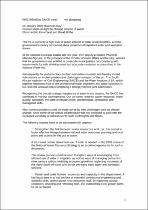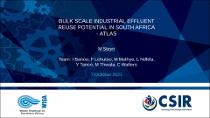 ResearchSpace
ResearchSpace
Rising costs of both sewage treatment and the production of potable water associated with increasing levels of pollution in a portion of the crocodile-west Marico water management area
JavaScript is disabled for your browser. Some features of this site may not work without it.
- ResearchSpace
- →
- Research Publications/Outputs
- →
- Conference Publications
- →
- View Item
| dc.contributor.author |
Roux, SP

|
|
| dc.contributor.author |
Oelofse, Suzanna HH

|
|
| dc.contributor.author |
De Lange, Willem J

|
|
| dc.date.accessioned | 2010-08-25T13:19:50Z | |
| dc.date.available | 2010-08-25T13:19:50Z | |
| dc.date.issued | 2010-04 | |
| dc.identifier.citation | Roux, S.P., Oelofse, S.H.H., and De Lange, W. 2010. Rising costs of both sewage treatment and the production of potable water associated with increasing levels of pollution in a portion of the Crocodile-West Marico water management area. WISA 2010 Biennial Conference and Exhibition ICC Durban, South Africa, 18 - 22 April 2010, pp 18 | en |
| dc.identifier.uri | http://hdl.handle.net/10204/4209 | |
| dc.description | WISA 2010 Biennial Conference and Exhibition ICC Durban, South Africa, 18 - 22 April 2010. | en |
| dc.description.abstract | Substantial quantities of water can be made available for use if the quality of return flows is of sufficient quality or treated to the desired quality. In 2006, in the order of 50% of urban and industrial drainage were returned for re-use in urban and industrial areas such as Johannesburg and Pretoria (3). The reuse potential of return flows is however largely dependent on the quality of the return flow combined with the quality requirements of the users. The four most important water quality problems are salinity, eutrophication, microbial pollution and sediments. The results of this study clearly indicate that pollution reduces the quality and therefore the economic value of the available water in the case study area. The most measurable impact in economic terms is the analysis of the costs incurred by municipal and private entities responsible for waste water treatment and potable water purification. Technology used to treat relative good quality water less than a decade ago must now be viewed as outdated and inadequate based on the deteriorated quality of intake water. The cost of recent technology upgrades in order to continue to produce water of potable quality clearly indicates the financial impact of pollution in the study area. This investigation clearly indicates the importance of pollution prevention over attempts to control the inevitable effects of current pollution practices in this study area. | en |
| dc.language.iso | en | en |
| dc.subject | Water Research Council | en |
| dc.subject | WRC | en |
| dc.subject | Microbial pollution | en |
| dc.subject | Sediments | en |
| dc.subject | Water quality | en |
| dc.subject | Sewage treatment | en |
| dc.subject | Crocodile-West Marico water management area | en |
| dc.subject | Water pollution | en |
| dc.subject | Potable water | en |
| dc.subject | WISA 2010 | en |
| dc.title | Rising costs of both sewage treatment and the production of potable water associated with increasing levels of pollution in a portion of the crocodile-west Marico water management area | en |
| dc.type | Conference Presentation | en |
| dc.identifier.apacitation | Roux, S., Oelofse, S. H., & De Lange, W. J. (2010). Rising costs of both sewage treatment and the production of potable water associated with increasing levels of pollution in a portion of the crocodile-west Marico water management area. http://hdl.handle.net/10204/4209 | en_ZA |
| dc.identifier.chicagocitation | Roux, SP, Suzanna HH Oelofse, and Willem J De Lange. "Rising costs of both sewage treatment and the production of potable water associated with increasing levels of pollution in a portion of the crocodile-west Marico water management area." (2010): http://hdl.handle.net/10204/4209 | en_ZA |
| dc.identifier.vancouvercitation | Roux S, Oelofse SH, De Lange WJ, Rising costs of both sewage treatment and the production of potable water associated with increasing levels of pollution in a portion of the crocodile-west Marico water management area; 2010. http://hdl.handle.net/10204/4209 . | en_ZA |
| dc.identifier.ris | TY - Conference Presentation AU - Roux, SP AU - Oelofse, Suzanna HH AU - De Lange, Willem J AB - Substantial quantities of water can be made available for use if the quality of return flows is of sufficient quality or treated to the desired quality. In 2006, in the order of 50% of urban and industrial drainage were returned for re-use in urban and industrial areas such as Johannesburg and Pretoria (3). The reuse potential of return flows is however largely dependent on the quality of the return flow combined with the quality requirements of the users. The four most important water quality problems are salinity, eutrophication, microbial pollution and sediments. The results of this study clearly indicate that pollution reduces the quality and therefore the economic value of the available water in the case study area. The most measurable impact in economic terms is the analysis of the costs incurred by municipal and private entities responsible for waste water treatment and potable water purification. Technology used to treat relative good quality water less than a decade ago must now be viewed as outdated and inadequate based on the deteriorated quality of intake water. The cost of recent technology upgrades in order to continue to produce water of potable quality clearly indicates the financial impact of pollution in the study area. This investigation clearly indicates the importance of pollution prevention over attempts to control the inevitable effects of current pollution practices in this study area. DA - 2010-04 DB - ResearchSpace DP - CSIR KW - Water Research Council KW - WRC KW - Microbial pollution KW - Sediments KW - Water quality KW - Sewage treatment KW - Crocodile-West Marico water management area KW - Water pollution KW - Potable water KW - WISA 2010 LK - https://researchspace.csir.co.za PY - 2010 T1 - Rising costs of both sewage treatment and the production of potable water associated with increasing levels of pollution in a portion of the crocodile-west Marico water management area TI - Rising costs of both sewage treatment and the production of potable water associated with increasing levels of pollution in a portion of the crocodile-west Marico water management area UR - http://hdl.handle.net/10204/4209 ER - | en_ZA |








